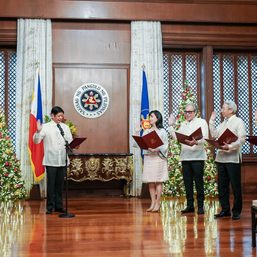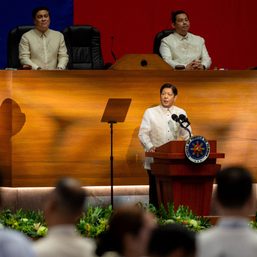SUMMARY
This is AI generated summarization, which may have errors. For context, always refer to the full article.

When 21 members of the UP School of Economics faculty released their discussion paper, “Maharlika Investment Fund: Still Beyond Repair,” early this month, memories of their past statements lit up my mind. Some of the names may have changed but academics from this institution spoke truth to power at pivotal moments in our nation’s political history.
In the twilight of the Martial Law years, they came out with an extensive report – “An Analysis of the Philippine Economic Crisis” – on what ailed our economy. The title was bland but the 100-page report was an indictment of the authoritarian regime of then-president Ferdinand Marcos. This was in June 1984, around a year after the brutal assassination of opposition leader Benigno “Ninoy” Aquino Jr.
Today, you can go back to this paper and mine the facts about what Marcos did to push our economy to the edge of the precipice.
Much later, during the nine-and-a-half-year presidency of Gloria Macapagal Arroyo, the UP economists called the country’s attention to two urgent problems at the time: the worsening deficit and public debt, in August 2004, and the need for a national population policy to reduce poverty, in December 2004.
Arroyo was hesitant to push for family planning or, more comprehensively, a reproductive health bill, because she was cozying up to the Catholic Church. She needed support as she began her controversial term as elected president.
The UP economists were seeing opportunities for growth fritter away, concerned about what one of the authors, Benjamin Diokno, would later call “the lost decade.” Diokno, as we know, has been a member of the Estrada and Duterte Cabinets. Now, as finance secretary, he is part of the team that pushed for the Maharlika Investment Fund (MIF).

The rush
President Marcos is expected to sign the MIF bill into law soon. The House of Representatives deliberated on the bill in a breathless pace – all of 17 days – and passed it on second and third reading on the same day in December last year, after which the Senate pored through it and introduced changes. Marcos then certified the Senate version of the bill as urgent and the House adopted and passed it on the last day of May, just before Congress went into recess.
The MIF will be capitalized by the national government and state banks like Landbank, the Development Bank of the Philippines, and the Bangko Sentral ng Pilipinas (BSP).
The Senate explicitly prohibited a number of government agencies from investing in the MIF because of the objections of pensioners and other sectors. These include the Social Security System, Government Service Insurance System, the Philippine Health Insurance Corporation, Pag-IBIG, Overseas Workers Welfare Administration, Philippine Veterans Affairs Office, and the Home Mutual Development Fund.
Marcos’s idea
It looks like not much thinking was done on the concept of such a fund, apparently a brainchild of President Marcos. Congressman Joey Salceda said that it was the President who requested the creation of the MIF: “This is really a presidential aspiration to finance grids, dams, national broadband which are always, by tradition of this Congress, relocated to the other programs.”
Marcos admitted in December last year that it was his idea: ”I wouldn’t have brought it up otherwise. It’s very clear that we need added investment. This is another way to get that.”
It is unclear if Marcos met with his economic team to fully thresh this out before turning it over to his cousin, Speaker Martin Romualdez. In November last year, during the aftermath of the pandemic, as our economy, burdened by rising debt, was slowly recovering but also feeling the harsh effects of the invasion of Ukraine, Romualdez announced the move in Congress to push for a sovereign wealth fund (SWF). The irony of a wealth fund for a country mired in loans worth P13 trillion was lost on the cousins.
Since then, the SWF has been subjected to intense criticisms, amended, and eventually morphed into an investment fund.
BSP Governor Felipe Medalla candidly told reporters: “It is no longer a sovereign wealth fund. It is now more of a national development, investment fund. I don’t know what it will be used for. But the way it’s evolving now, it will be very targeted and it will have many good governance principles.”
What’s wrong?
In their 28-page paper, the UP economists pointed out the absence of clarity in the MIF’s goals. Thus, it is “not aligned to the Philippine Development Plan nor the Medium-Term Fiscal Framework,” it is “vague about MIF’s expected financial and economic returns,” and the MIF “threatens to encroach upon the budget process.”
Also, the “manner of funding the MIF poses huge risks to our already strained public coffers and is vulnerable to moral hazard…and red flags abound in the MIC’s governance structure.” You can read the paper here.
Diokno dismissed his former colleagues’ criticisms, saying there was “so much distrust. Ang dami namang nilagay na safeguard ng Senado (The Senate has placed many safeguards.)”
The voices of the UP economists may have come late but those who will manage the MIF can still learn from them.
Till next week. Let me know what you think: email me at marites.vitug@rappler.com. – Rappler.com
Add a comment
How does this make you feel?










There are no comments yet. Add your comment to start the conversation.